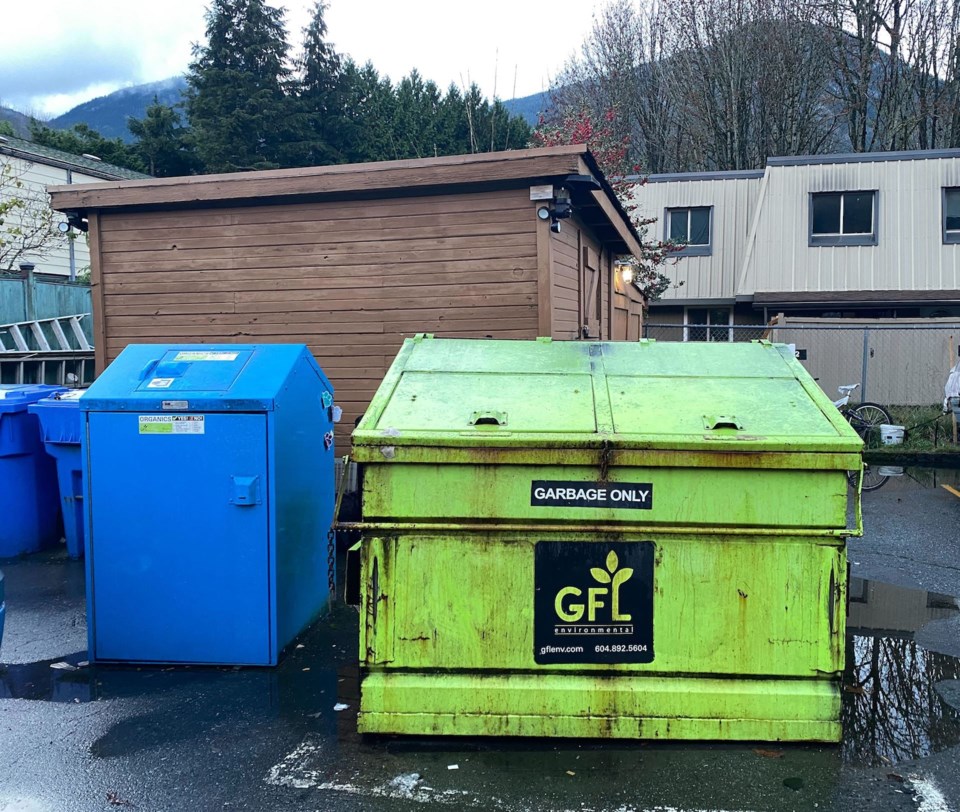New food establishments applying for a business license in Squamish could soon have to provide a Waste Diversion Management Plan (WDMP) with their applications.
Up until now, all existing food businesses have not been required to submit a waste plan when applying for a business license, but District staff say the change would “ensure waste reduction and disposal best practices are being considered.”
At the Nov. 12 committee of the whole meeting, council voted in favour of bringing the solid waste and business license bylaw-related amendments to a future regular council meeting for the first of three readings.
“A template would be provided to reduce the time requirement to complete a WDMP. This Plan would be reviewed by Staff to ensure the applicant has effectively considered the materials they will generate through their business,” reads the report.
“It also would provide an opportunity for staff to engage with the applicant to ensure waste reduction and disposal best practices are being considered.
“The intention is not to withhold a [business licence], but to open up a conversation with the applicant about the requirements of the District and opportunities.”
The requirement would apply to new applications only, not annual renewals.
Mayor Armand Hurford shared his hesitancy to implement the waste management plan program solely for new food businesses.
“I don't think it needs to be in the bylaw, but including some language to our existing businesses like ‘Hey, this is what we ask of new business licenses, and you may be asked for this in the future at a renewal’ might be enough for me,” he said.
Staff responded to Hurford’s comments to explain why they chose new food businesses to bear the weight of the new waste management program.
“The intent is not to put more cost on them but to have it better incorporated into their business, whereas with current or pre-existing businesses, it's going to be a bit more of a lift,” District integrated solid waste specialist Shannon White said.
White said that it might be more difficult to implement the program for existing businesses because they might not have the space for things such as compost bins because they weren’t accounted for when they built their kitchen.
“So that is why we have thought that new businesses would be an easier beginning step for this program and then roll it into hopefully existing businesses,” she said.
Coun. Andrew Hamilton also echoed Hurford’s comments and made a motion to request that “staff bring back a plan or proposal on how they will implement a waste management plan throughout existing businesses, not just new businesses.”
Hurford requested an amendment to ensure that “the plan will come back with the next solid waste progress report update to council” which all councillors voted in favour of.
During the beginning of the meeting, White revealed that since the District’s residential recycling program launched in 2009, there has been a “51% decrease in the amount of waste generated per person” in Squamish.
She explained that during the same time period, the town saw an 81% increase in population.
What else is included in the amendments?
The report also shows a revision of the District’s ability to discontinue or suspend curbside collection service for households that are not in compliance with the requirements.
The review aims to “clarify” the suspension or discontinuing of the service to those largely “related to wildlife attractant management and contamination, for curbside collection.”
“We've been struggling in the sense that there are some households that continually have essentially gross contamination levels, gross not being disgusting, but large amounts. So full of construction material or a vacuum cleaner, stuff like this, which is now causing the District of Squamish financial penalties,” White said.
“So what we are looking to do is very clearly establish a process, ideally, to suspend a household from the services until they're able to work with us to make sure that they understand the requirements around contamination, but also around wildlife management.
“There are communities that are doing the suspension around contamination, in particular where residents have to do an online test and get their knowledge up to speed, and then they get it back.
“So we're looking at how it's been modelled in other communities.”
As for the wildlife attractant issues, District staff said they are looking into options for households or complexes that really struggle with bears accessing their totes, even if they are locked.
For more information on the solid waste and business license bylaw related amendments, visit the




